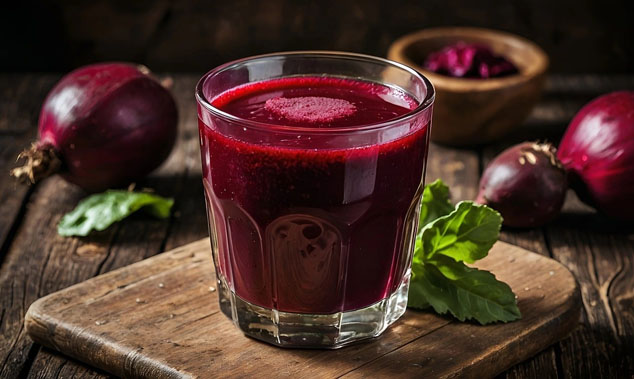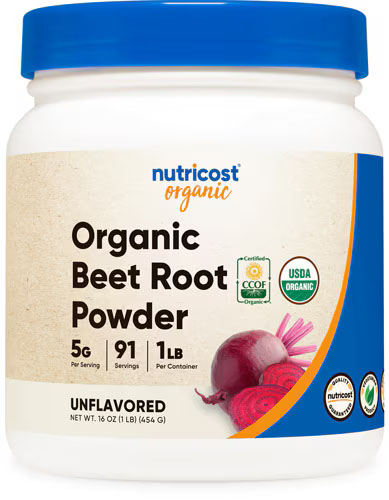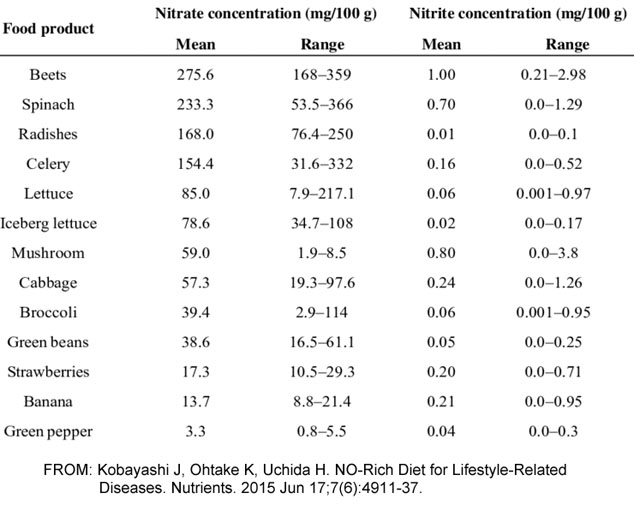
Now we even have AI weighing in on the health benefits of beets. Keep in mind that the “A” in AI stands for “artificial” and the “I” stands for “intelligence.” In other words, this means the same old-time principle describing the early use of computers still applies – i.e., garbage in, garbage out. You still have to keep your human wits about you to make sure whatever comes out of AI is verifiable.
So, just for fun, I asked ChatGPT to write up a list of the health benefits of beets. It’s an okay list, although it fails to explain much about the top benefits, which are cardiovascular. I went into more detail on that aspect of beets in an earlier post, here: https://herbscientist.com/eat-veggies-get-nitric-oxide/.
[Full response is all in italics below – with occasional yellow-highlighted comments by me.]
Beets offer a range of health benefits due to their rich nutritional profile and bioactive compounds. Here’s a detailed breakdown of the health benefits of beets:
- Improved Heart Health. Beets are rich in nitrates, which are converted into nitric oxide in the body. Nitric oxide helps relax and dilate blood vessels, improving blood flow and reducing blood pressure. This is the number one health benefit from eating beets; and, beets are one of many nitrate-accumulating veggies.
- Boosted Athletic Performance. The nitrates in beets improve oxygen utilization and endurance during exercise. Beets are rich in antioxidants and anti-inflammatory compounds that support muscle recovery after intense workouts. Overkill claim – this describe just about all fruits and veggies.
- Rich in Nutrients. Beets are an excellent source of folate (vitamin B9), manganese, potassium, iron, and vitamin C. They are nutrient-dense yet low in calories, making them a healthy addition to most diets. Ditto about antioxidants for athletic performance.
- Anti-Inflammatory Properties. The read pigmenst – betalains – give beets their vibrant color and have anti-inflammatory properties, which may help manage chronic inflammation linked to conditions like arthritis and heart disease. You couldn’t eat enough beets to realize these benefits. Look instead for processed foods that use added betalains as a natural colorant.
- Supports Digestive Health. Beets are high in fiber, promoting healthy digestion, preventing constipation, and supporting gut health. This is a lot of ‘maybes’ – dietary fiber is overrated. There are much better ways to support gut health.
- Brain Health. The nitrates in beets enhance blood flow to the brain, potentially improving mental clarity, focus, and reducing the risk of age-related cognitive decline. Enhanced blood flow to brain areas linked to memory and decision-making may slow the progression of dementia. This is another cardiovascular benefit, in this case for brain vasculature.
- Detoxification. Beets contain betaine, which helps the liver eliminate toxins and supports overall liver function. Singling the liver is uninformative. All organs benefit from betaine. It’s a supplement unto its own, and some foods provide at least as much as beets do [e.g., spinach, crustaceans, finfish].
- Blood Sugar Regulation. Despite being naturally sweet, beets have a low glycemic index, meaning they release sugar slowly into the bloodstream. Another side benefit of having sugar-containing whole foods diluted with fiber.
- Cancer Prevention Potential. Beets contain powerful antioxidants like vitamin C and betalains, which may help reduce oxidative stress and lower the risk of certain cancers. Evidence for this claim is, at best, pretty thin.
- Weight Management. The fiber in beets promotes feelings of fullness, helping control appetite. Beets are a filling, low-calorie food that fits well into weight-loss plans. Calories are irrelevant for evaluating any food for weight management.
- Skin Health. The antioxidants in beets combat free radicals, potentially reducing wrinkles and improving skin elasticity. Cosmetics folks make a lot of claims like this, for just about everything under the sun. It’s a pretty shallow claim.
- Support for Anemia. Beets provide non-heme iron, which can help prevent iron-deficiency anemia when paired with vitamin C for better absorption. Regarding iron, more is not necessarily better. Iron metabolism is a very complicated topic.
Incorporating beets into your diet as roasted vegetables, salads, juices, or even as beet powder can maximize these benefits. However, moderation is key, as excessive consumption might cause side effects like beeturia (pink or red urine) or kidney issues in those prone to kidney stones due to oxalate content. If moderation is key, then this is easy with beets. Even if you love them, consuming beets in large amounts is simply unappealing. That comment about beeturia, however, is entertaining. And it’s true.
Beet Supplements
Supplement manufacturers have nailed this one. Many, many beet supplements are on the market. You can get beet juice products at Whole Foods, costing upwards of #3.00 per day. Beet lozenges are pretty common, since the biochemistry of converting nitrate into nitric oxide starts with bacteria in your mouth. They’re still pretty expensive, though.
For my money, I prefer plain beet powder that I can put into nutrition shakes and smoothies. Vitacost.com usually has the best prices. This is the one I use:

Other Sources of Dietary Nitrates
Besides being additives to processed meats, nitrates are pretty common in food crops. The sources include one of the ‘big 3’ components of fertilizers used in agriculture – nitrogen (as nitrates), phosphorous, potassium (i.e., NPK on the product label). Bottom line: it’s nearly impossible to avoid them.
Nevertheless, if you want to make sure you’re getting plenty, here is a good list of foods with their nitrate content.

Just pick a selection of these for each meal, and you’re probably good.
Still, getting a boatload of nitric oxide from nitrates in food is a bit more of a challenge than taking a spoonful of beet powder every now and them.
And it’s a whole lot easier than eating enough of the right kind of dirt!
Comments or Questions?
I’d love to hear from you. This and every other post here provides a comment section at the end of the post, exactly for that purpose.
So, by all means, leave me your thoughts.
I would be especially grateful if you point out any flaws in my logic, factual errors, or ordinary typos. (I’ll give you a little ‘huzzah’ in my heart.)
Then I’ll respond as soon as I can.
References
Kukovetz WR, Holzmann S, Romanin C. Mechanism of vasodilation by nitrates: role of cyclic GMP. Cardiology. 1987;74 Suppl 1:12-9. doi: 10.1159/000174258. PMID: 2886220. https://pubmed.ncbi.nlm.nih.gov/2886220/
Hobbs DA, Kaffa N, George TW, Methven L, Lovegrove JA. Blood pressure-lowering effects of beetroot juice and novel beetroot-enriched bread products in normotensive male subjects. Br J Nutr. 2012 Dec 14;108(11):2066-74. doi: 10.1017/S0007114512000190. Epub 2012 Mar 14. PMID: 22414688. https://pubmed.ncbi.nlm.nih.gov/22414688/
Kerley CP, Dolan E, Cormican L. Nitrate-rich beetroot juice selectively lowers ambulatory pressures and LDL cholesterol in uncontrolled but not controlled hypertension: a pilot study. Ir J Med Sci. 2017 Nov;186(4):895-902. doi: 10.1007/s11845-016-1551-2. Epub 2017 Jan 3. PMID: 28050806. https://pubmed.ncbi.nlm.nih.gov/28050806/
Presley TD, Morgan AR, Bechtold E, Clodfelter W, Dove RW, Jennings JM, Kraft RA, King SB, Laurienti PJ, Rejeski WJ, Burdette JH, Kim-Shapiro DB, Miller GD. Acute effect of a high nitrate diet on brain perfusion in older adults. Nitric Oxide. 2011 Jan 1;24(1):34-42. doi: 10.1016/j.niox.2010.10.002. Epub 2010 Oct 15. PMID: 20951824; PMCID: PMC3018552. https://pubmed.ncbi.nlm.nih.gov/20951824/
Lansley KE, Winyard PG, Bailey SJ, Vanhatalo A, Wilkerson DP, Blackwell JR, Gilchrist M, Benjamin N, Jones AM. Acute dietary nitrate supplementation improves cycling time trial performance. Med Sci Sports Exerc. 2011 Jun;43(6):1125-31. doi: 10.1249/MSS.0b013e31821597b4. PMID: 21471821. https://pubmed.ncbi.nlm.nih.gov/21471821/
Bailey SJ, Winyard P, Vanhatalo A, Blackwell JR, Dimenna FJ, Wilkerson DP, Tarr J, Benjamin N, Jones AM. Dietary nitrate supplementation reduces the O2 cost of low-intensity exercise and enhances tolerance to high-intensity exercise in humans. J Appl Physiol (1985). 2009 Oct;107(4):1144-55. doi: 10.1152/japplphysiol.00722.2009. Epub 2009 Aug 6. PMID: 19661447. https://pubmed.ncbi.nlm.nih.gov/19661447/
Pinaffi-Langley ACDC, Dajani RM, Prater MC, Nguyen HVM, Vrancken K, Hays FA, Hord NG. Dietary Nitrate from Plant Foods: A Conditionally Essential Nutrient for Cardiovascular Health. Adv Nutr. 2024 Jan;15(1):100158. doi: 10.1016/j.advnut.2023.100158. Epub 2023 Nov 24. PMID: 38008359; PMCID: PMC10776916. https://pmc.ncbi.nlm.nih.gov/articles/PMC10776916/
Madadi E, Mazloum-Ravasan S, Yu JS, Ha JW, Hamishehkar H, Kim KH. Therapeutic Application of Betalains: A Review. Plants (Basel). 2020 Sep 17;9(9):1219. doi: 10.3390/plants9091219. PMID: 32957510; PMCID: PMC7569795. https://pmc.ncbi.nlm.nih.gov/articles/PMC7569795/
Arumugam MK, Paal MC, Donohue TM Jr, Ganesan M, Osna NA, Kharbanda KK. Beneficial Effects of Betaine: A Comprehensive Review. Biology (Basel). 2021 May 22;10(6):456. doi: 10.3390/biology10060456. PMID: 34067313; PMCID: PMC8224793. https://pmc.ncbi.nlm.nih.gov/articles/PMC8224793/
Moustarah F, Daley SF. Dietary Iron. [Updated 2024 Jan 8]. In: StatPearls [Internet]. Treasure Island (FL): StatPearls Publishing; 2025 Jan-. Available from: https://www.ncbi.nlm.nih.gov/books/NBK540969/
Kobayashi J, Ohtake K, Uchida H. NO-Rich Diet for Lifestyle-Related Diseases. Nutrients. 2015 Jun 17;7(6):4911-37. doi: 10.3390/nu7064911. PMID: 26091235; PMCID: PMC4488823. https://pubmed.ncbi.nlm.nih.gov/26091235/
All the best in natural health,
![]()
Statements on this page have not been evaluated by the Food and Drug Administration. This product is not intended to diagnose, treat, cure, or prevent any disease.
Does pickled beets have the same health benefits ?
Hey, Don! Good to hear from you. The quick answer to your question is, no. Processing always takes something out. Enjoy them as much as you can, anyway.
Cheers,
Dennis